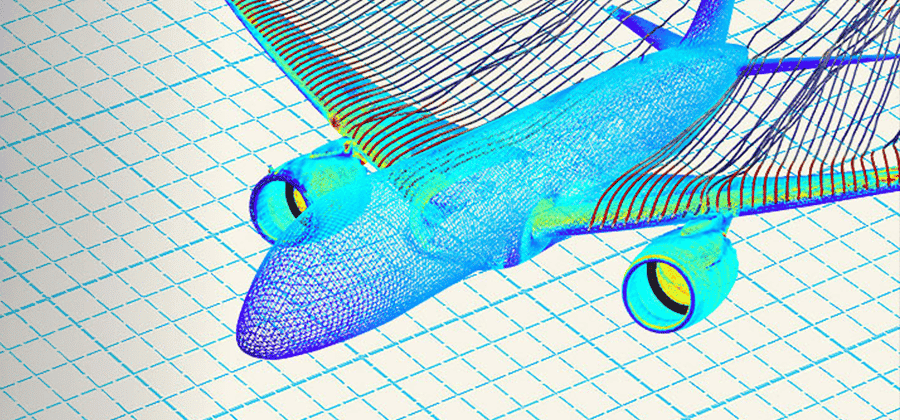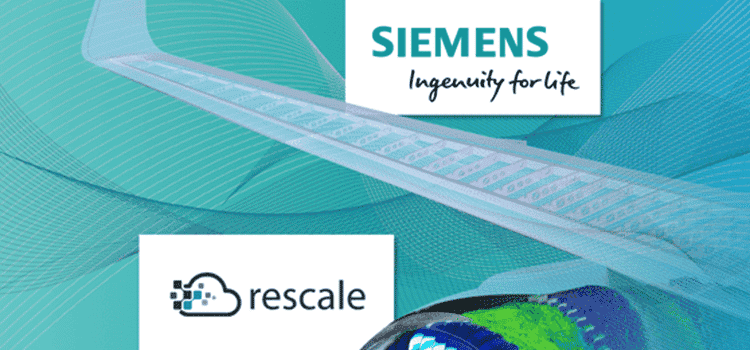Rescale Announces AI Physics at NVIDIA GTC to Transform Simulation Speed and Efficiency
AI Physics gives engineers access to the latest technologies to deploy custom AI models for rapid R&D from automotive racing and beyond.
Yesterday at NVIDIA GTC, amid the excitement of new innovations in technology and industry, Rescale announced AI Physics Powered by NVIDIA alongside automotive powerhouse and pioneering Rescale customer, General Motors Motorsports. As Sam Altman tweeted to kick off the week, “This is the most interesting year in human history, except for all future years” which was definitely confirmed by GTC 2024.
As seen in the opening keynote from NVIDIA CEO Jensen Huang, the world is transforming in front of our eyes, from AI chips designed with generative AI to AI software that trains robots in the digital world with stunning accuracy. As industry races to commercialize these new technologies, AI Physics on Rescale is already delivering many of the most cutting edge tools for AI-driven R&D directly into the hands of engineers and scientists to reach new breakthroughs with unprecedented computing speed and efficiency.
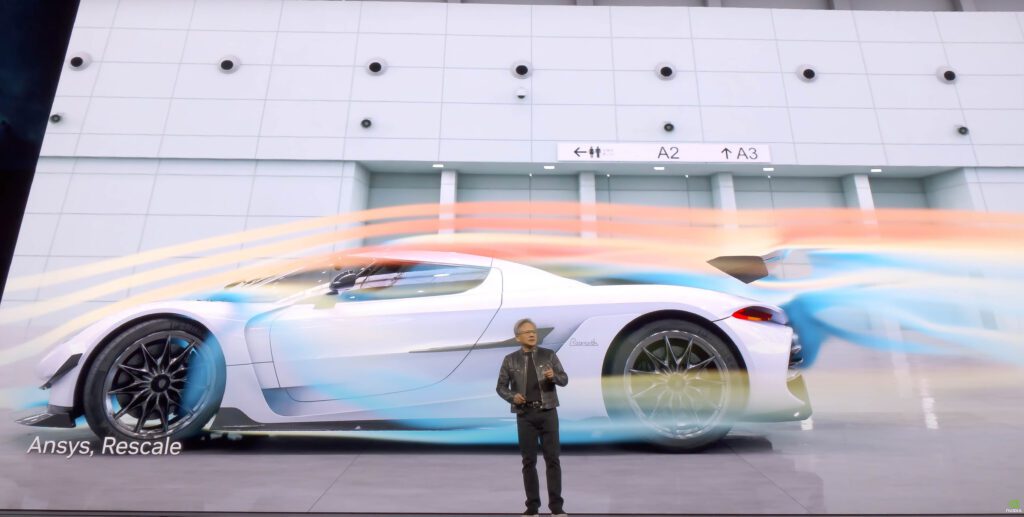
Harnessing AI Physics to Accelerate Engineering Velocity
The practical usefulness of AI continues to reach new heights. As AI software developers and hardware developers achieve new milestones, they unlock new possibilities for domain specialists driving innovation in various industries – nuclear physicists, the vaccine researchers, and aerospace engineers for example.
Recent advancements in specialized, physics-based algorithms make it possible to reduce the computational complexity and time required to solve even the most challenging problems. The result is lightning-fast AI predictions with near 99%+ accuracy, which is already transforming the way GM Motorsports and others develop new products at unprecedented pace.
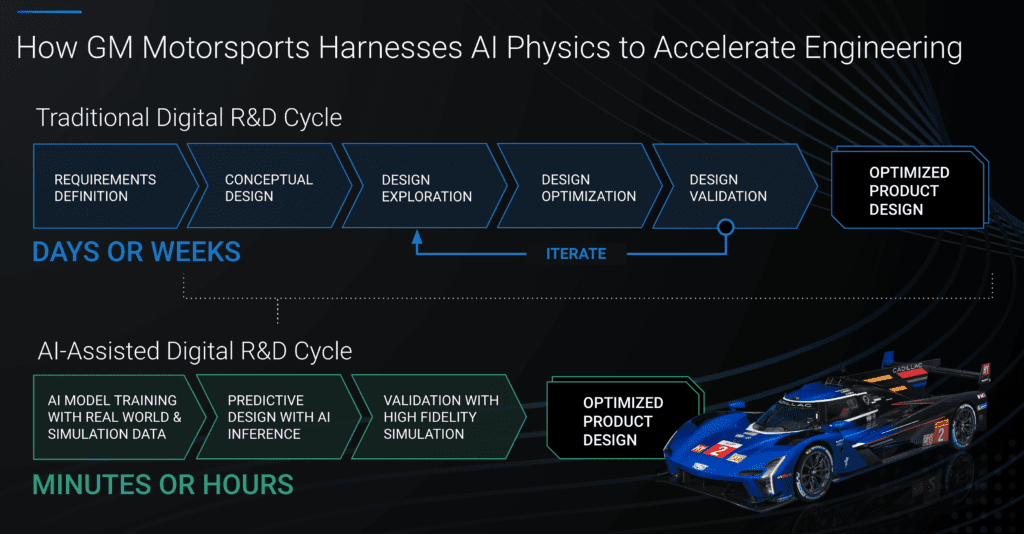
Rescale AI Physics unifies the latest AI software and hardware on the market with a broad ecosystem of powerful simulation capabilities to enhance computational engineering and science, the lifeblood of innovation in virtually every industry. As traditional simulation techniques reach the limits of computational speed, R&D teams are looking for new ways to explore even more possibilities in shorter periods of time, a seemingly impossible task until recent advances in AI.
This collaboration between Rescale and NVIDIA is a game-changer for engineers exploring the frontier of physics possibilities to develop new and improved products. Imagine being an engineer working on the next generation of electric vehicles. Every design aspect, from aerodynamics to battery efficiency, requires hundreds of simulations to ensure you’re not just creating a vehicle that moves but one that pushes the boundaries of what’s possible. Now, with AI Physics, what used to take days can be accomplished in minutes or even seconds.
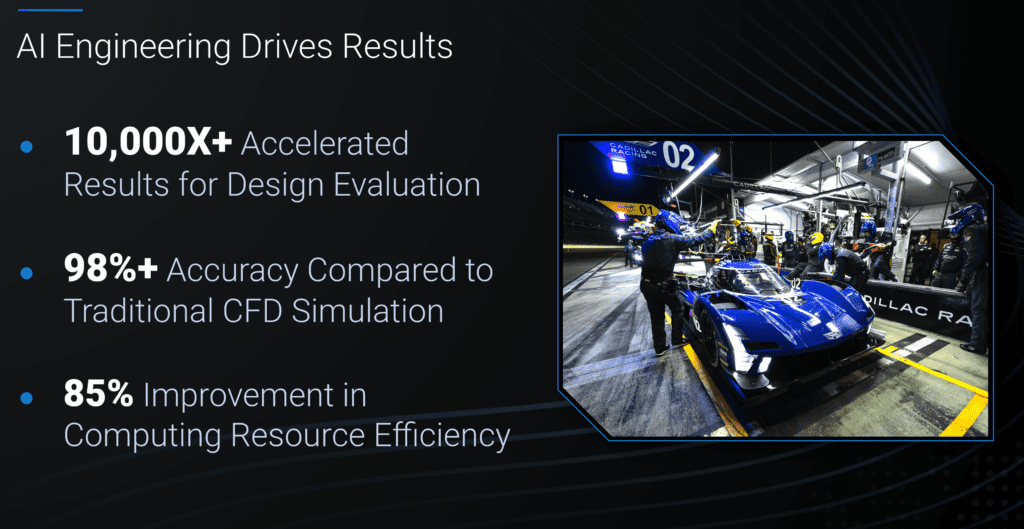
AI Physics Enhances Engineering Simulation
The concept of AI physics merges probabilistic physics-based AI algorithms with deterministic simulation, which enhances the computer-aided engineering (CAE) based methods like computational fluid dynamics (CFD) and finite element analysis (FEA) solvers commonly used by R&D teams today. This blend allows for making highly accurate predictions at speeds previously unimaginable.
But how does it work? Think of it as having your own Albert AI-nstein at your disposal to give you highly accurate physics advice throughout the product lifecycle. Products would begin with much better first concepts and prototypes and optimization would be focused on only the best viable design candidates. Imagine you’re working on creating a new, more efficient wind turbine: using AI Physics on Rescale, you can rapidly test thousands of designs, analyzing airflow and energy output in a fraction of the time it would take with traditional simulation. In a typical workflow (see figure below), engineering teams 1) generate data with their preferred simulation application – or use existing data, 2) use that data to train a custom or fine tune a pre-trained AI model, and then 3) perform inference on the model by submitting new design shapes for rapid prediction. Designs can be submitted for final validation with the simulation application or ongoing tuning of the custom model itself. By using first-party data, R&D teams can train AI Physics models to produce highly accurate predictions based on their specific needs and past domain experience.
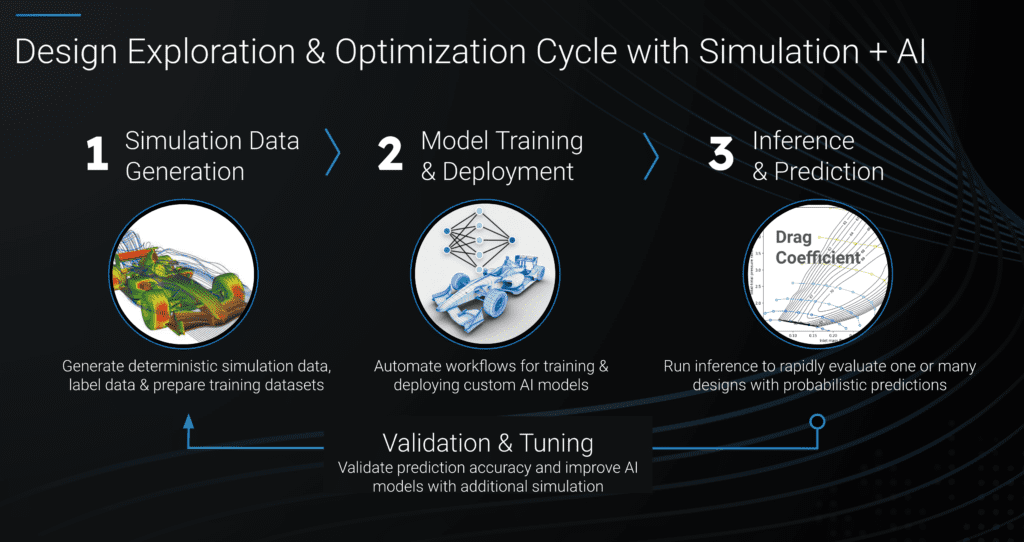
AI-enhanced engineering isn’t only about speed; it’s about unlocking the potential to explore larger design spaces and design configurations you wouldn’t even consider before, due to computational limitations. This Einstein-level physics understanding is baked into a wide range of AI software and tools available on Rescale, from specialized AI physics software and NVIDIA’s AI Enterprise suite of top-tier AI frameworks and developer tools to build custom models based on each company’s unique use case.
Driving Impact Across Domains
The impact of AI-driven R&D is vast and varied. In the automotive industry, for example, companies like General Motors Motorsports can now test the aerodynamics of their vehicles rapidly and more extensively and efficiently, leading to designs that are both faster and safer. Similarly, aerospace companies can simulate aircraft performance under a wider range of conditions to ensure safety and efficiency, while life sciences firms can model complex biological processes at speeds that can accelerate the path to new discoveries.
To put the potential of AI Physics into perspective, consider the field of computational fluid dynamics (CFD). Traditional CFD simulations are notoriously resource-intensive. With AI Physics, engineers can train AI models with existing simulation data, drastically reducing the computational load for new simulations. This capability can transform industries reliant on fluid dynamics, such as automotive, aerospace, and energy, by enabling more frequent and comprehensive simulations. Another example is the design and testing of materials at the nanoscale, crucial for the semiconductor and manufacturing industries. AI Physics can accelerate the discovery of new materials with desired properties by predicting material behavior faster and more accurately than ever before.
AI Physics Acceleration Compared to Hardware Acceleration

Joris Poort, CEO of Rescale, shared during the announcement that AI Physics has been used by customers to deliver staggering results in range of domains including:
- 100+ hours of crash analysis in 15 seconds (2.4 million times faster)
- 72,000x faster analysis for CPG material exploration
- 3x faster overall product development for heat sink thermal management
Rescale’s Platform Advantage for AI
The technology stack behind AI Physics brings together the latest open-source and commercial AI technologies and automates the full stack and workflows to simplify the user experience for any R&D team to get started quickly: NVIDIA Modulus for pre-trained Physics ML models and NVIDIA NeMo for Generative AI, and developer tools like CUDA, TAO, and RAPIDS. Additionally, a growing ecosystem of AI Physics applications are available from domain specialists like Navasto, Neural Concept, Navier AI, and more to come. Add to this the AI accelerated NVIDIA GPU architectures from leading public and specialty cloud providers, and you have an R&D environment that is as fast as it is flexible.
Announcing AI Physics Powered by NVIDIA
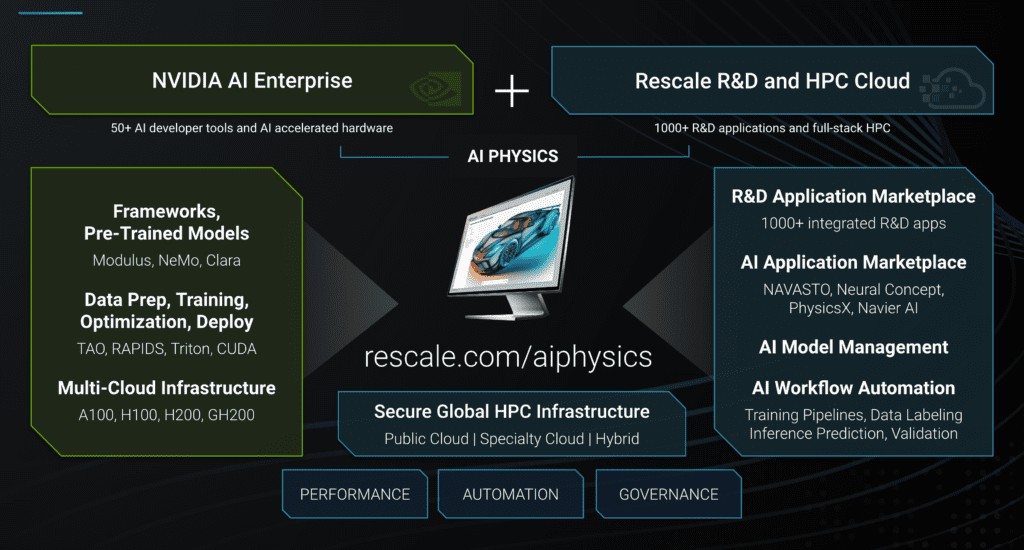
What’s truly exciting is the accessibility of this technology. With AI Physics, custom AI models and workflows that were once the domain of only the most well-funded research institutions are now within reach of a much broader range of organizations. This democratization of high-performance computing could lead to a surge in innovation across industries.
New Industry Breakthroughs Await
The announcement of AI Physics illustrates the continued acceleration of computing needed to solve the worlds biggest, toughest problems. Generalized computing has been on a long plateau of growth and this partnership between Rescale and NVIDIA opens up a new frontier of accelerated computing. It’s not just about faster computation; it’s about enabling new types of inquiries and innovations that were previously beyond our reach. We encourage R&D leaders and practitioners in every industry to think about how they can transform the pace of innovation with the power of AI-enhanced simulation in these use cases and beyond:

For organizations interested in learning more about the trend of AI applied to simulation or the AI Physics offering, the GTC talk with Rescale and General Motors is a must-watch. It’s not every day we witness a leap in technology that can fundamentally change how we understand and transform the world around us.



